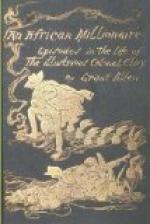“He introduced your name,” I said, “and the moment he found out who I was he plunged into talk with me.”
“Yes,” Charles continued. “He may have learned about the portrait of Maria Vanrenen, which my grandmother always said was preserved at Gouda; and, indeed, I myself have often mentioned it, as you doubtless remember. If so, what more natural, say, for a rogue than to begin talking about the portrait in that innocent way to Amelia? If he wants a Rembrandt, I believe they can be turned out to order to any amount in Birmingham. The moral of all which is, it behoves us to be careful.”
“Right you are,” I answered; “and I am keeping my eye upon him.”
We drove back by another road, overshadowed by beech-trees in autumnal gold. It was a delightful excursion. Dr. Polperro’s heart was elated by lunch and the excellent dry Monopole. He talked amazingly. I never heard a man with a greater or more varied flow of anecdote. He had been everywhere and knew all about everybody. Amelia booked him at once for her “At Home” on Wednesday week, and he promised to introduce her to several artistic and literary celebrities.
That evening, however, about half-past seven, Charles and I strolled out together on the King’s Road for a blow before dinner. We dine at eight. The air was delicious. We passed a small new hotel, very smart and exclusive, with a big bow window. There, in evening dress, lights burning and blind up, sat our friend, Dr. Polperro, with a lady facing him, young, graceful, and pretty. A bottle of champagne stood open before him. He was helping himself plentifully to hot-house grapes, and full of good humour. It was clear he and the lady were occupied in the intense enjoyment of some capital joke; for they looked queerly at one another, and burst now and again into merry peals of laughter.
I drew back. So did Sir Charles. One idea passed at once through both our minds. I murmured, “Colonel Clay!” He answered, “and Madame Picardet!”
They were not in the least like the Reverend Richard and Mrs. Brabazon. But that clinched the matter. Nor did I see a sign of the aquiline nose of the Mexican Seer. Still, I had learnt by then to discount appearances. If these were indeed the famous sharper and his wife or accomplice, we must be very careful. We were forewarned this time. Supposing he had the audacity to try a third trick of the sort upon us we had him under our thumbs. Only, we must take steps to prevent his dexterously slipping through our fingers.
“He can wriggle like an eel,” said the Commissary at Nice. We both recalled those words, and laid our plans deep to prevent the man’s wriggling away from us on this third occasion.




